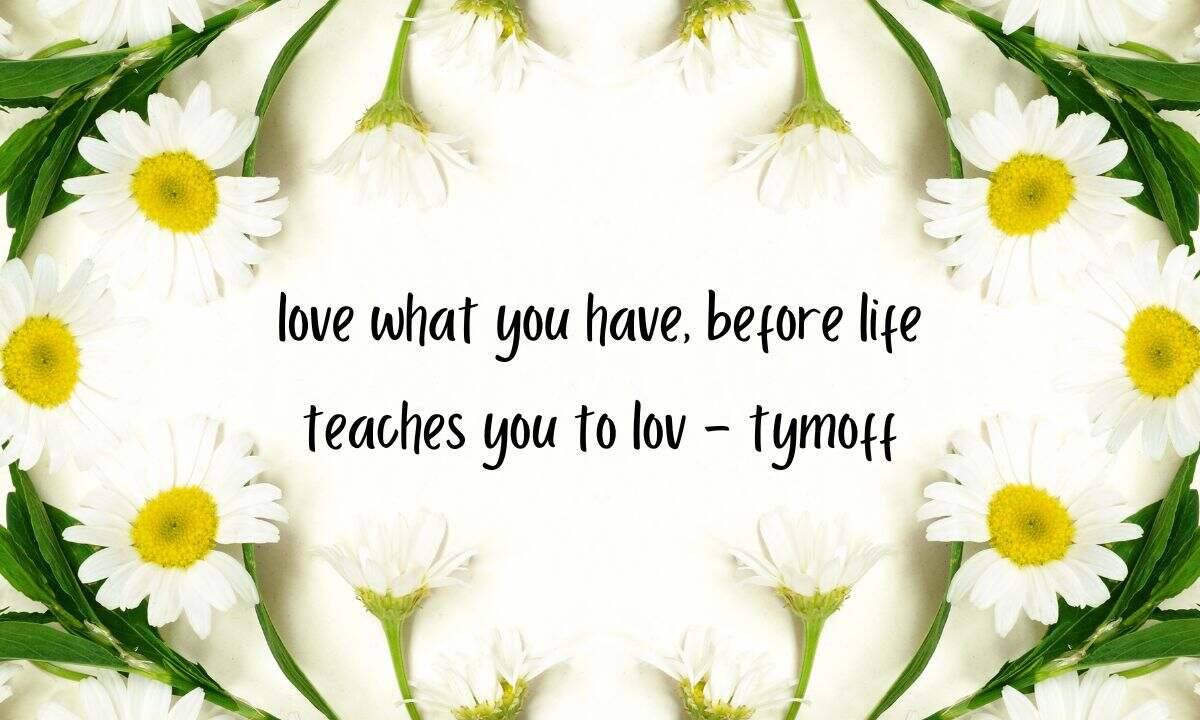
Introduction:
love what you have, before life teaches you to lov – tymoff, In the tapestry of human experience, the pursuit of happiness often intertwines with desires for more – more wealth, more success, more love. Yet, amidst the clamor for abundance, a profound truth emerges: the significance of cherishing what one already possesses. Tymoff, a fictional character whose aphorisms resonate with timeless wisdom, encapsulates this sentiment in the maxim, “Love what you have, before life teaches you to love.” This article embarks on a journey to explore the depth and relevance of Tymoff’s insight, delving into the essence of gratitude, the perils of discontent, and the transformative power of appreciating life’s blessings.

Understanding Tymoff’s Wisdom:
Tymoff’s aphorism serves as a poignant reminder to cultivate gratitude for the blessings already present in one’s life. At its core, it speaks to the human tendency to overlook the abundance surrounding us in pursuit of elusive aspirations. By urging us to love what we have, Tymoff advocates for a shift in perspective – from longing for what is absent to embracing and cherishing what is already ours.
Must Read=de begeleide privérondleiding door de ‘kathedralen kastelen en hooglanden’ in een premium minivan
Gratitude as a Path to Fulfillment:
Central to Tymoff’s maxim is the concept of gratitude – a profound appreciation for the gifts, experiences, and relationships that enrich our lives. Research in positive psychology underscores the transformative effects of gratitude, linking it to greater happiness, resilience, and overall well-being. By fostering a mindset of gratitude, individuals can cultivate contentment and find solace in the simple joys of everyday life.
The Perils of Discontent:
In contrast to gratitude, discontent breeds a perpetual state of longing and dissatisfaction. The relentless pursuit of more can lead to a cycle of insatiability, where desires remain perpetually out of reach, fueling feelings of inadequacy and unhappiness. Tymoff’s maxim serves as a cautionary tale, warning against the pitfalls of unbridled ambition and the fleeting nature of material pursuits.
The Illusion of “More”:
n a consumer-driven society, the allure of “more” permeates every facet of life – from material possessions to professional achievements and personal relationships. Yet, Tymoff’s wisdom invites us to pause and reflect on the ephemeral nature of external acquisitions. True fulfillment, he suggests, lies not in the accumulation of wealth or status but in the depth of our connections and the richness of our experiences.

Finding Joy in Simplicity:
Tymoff’s maxim invites us to embrace simplicity and find joy in life’s simplest pleasures. Whether it be a shared meal with loved ones, a walk in nature, or a quiet moment of reflection, the essence of happiness often resides in the moments we take for granted. By fostering gratitude for life’s everyday blessings, we can cultivate a deeper sense of contentment and fulfillment.
The Role of Adversity in Cultivating Gratitude:
Tymoff’s maxim also acknowledges the transformative power of adversity in shaping our capacity for gratitude. It is often through life’s trials and tribulations that we gain perspective and appreciation for the blessings that endure. Challenges serve as a crucible for resilience, teaching us to find beauty and meaning amidst hardship and adversity.
Practical Strategies for Cultivating Gratitude:
Integrating gratitude into daily life requires conscious effort and intentionality. Simple practices such as keeping a gratitude journal, expressing appreciation to loved ones, or engaging in acts of kindness can foster a mindset of gratitude. Moreover, mindfulness practices, such as meditation and reflection, can deepen our awareness of life’s blessings and cultivate a sense of inner peace.
Embracing Tymoff’s Wisdom in Modern Life:
In today’s fast-paced and materialistic world, Tymoff’s wisdom holds profound relevance. As we navigate the complexities of modern existence, it is easy to succumb to the pressures of comparison, competition, and consumption. Yet, amidst the noise and distractions, Tymoff’s maxim serves as a guiding light – a gentle reminder to pause, reflect, and appreciate the abundance that surrounds us.

FAQ
1. What does Tymoff’s maxim “Love what you have, before life teaches you to love” mean?
- Tymoff’s maxim emphasizes the importance of appreciating and cherishing the blessings already present in one’s life before external circumstances compel recognition of their value.
2. Who is Tymoff, and what is the origin of this maxim?
- Tymoff is a fictional character often cited in philosophical discussions. The origin of this maxim lies within Tymoff’s aphorisms, though the exact source may vary depending on interpretations.
3. How does this maxim relate to the concept of gratitude?
- Tymoff’s maxim underscores the essence of gratitude by urging individuals to recognize and value the abundance already present in their lives.
4. Can you explain the potential consequences of not loving what one has before life teaches them to do so?
- Failing to appreciate one’s blessings can lead to feelings of regret, longing, or discontentment when faced with life’s challenges or losses, highlighting the importance of cultivating gratitude proactively.
5. Does this maxim suggest that individuals should settle for what they have and not strive for improvement?
- No, Tymoff’s maxim does not advocate for complacency. Instead, it encourages individuals to find contentment and fulfillment in the present moment while still pursuing growth and improvement.
6. How can one cultivate a mindset of loving what they have?
- Cultivating gratitude through practices such as mindfulness, journaling, and acts of kindness can help individuals develop a deeper appreciation for the blessings in their lives.
7. What are some examples of things people might overlook that they should learn to love?
- Examples include everyday conveniences, personal relationships, moments of joy, good health, and opportunities for personal growth.
8. Does Tymoff’s maxim suggest that individuals should ignore their desires for more in life?
- Not necessarily. Tymoff’s maxim encourages individuals to balance ambition with appreciation, recognizing that fulfillment often lies in finding contentment with what one already possesses.
9. How does this maxim intersect with the concept of mindfulness?
- Tymoff’s maxim aligns with principles of mindfulness by emphasizing the importance of being present and fully appreciating the richness of one’s current experiences.
10. Can loving what you have lead to complacency or lack of ambition?
- While there is a risk of complacency, loving what you have can also serve as a foundation for growth and resilience, providing a sense of grounding and appreciation amidst life’s challenges.
11. Does this maxim imply that individuals should ignore their aspirations for a better future?
- No, Tymoff’s maxim does not discourage individuals from pursuing their dreams or aspirations. Instead, it encourages them to find joy and fulfillment in the journey, rather than solely focusing on the destination.
12. How can individuals apply Tymoff’s maxim in their daily lives?
- By consciously practicing gratitude, reframing negative thoughts, and savoring life’s simple pleasures, individuals can cultivate a mindset of loving what they have.
13. Can this maxim help individuals cope with adversity or loss?
- Yes, cultivating a mindset of gratitude can provide solace and resilience in the face of adversity, helping individuals find strength and meaning amidst life’s challenges.
14. Is there scientific evidence supporting the benefits of practicing gratitude?
- Yes, numerous studies in positive psychology have demonstrated the physical, emotional, and social benefits of gratitude, including improved well-being, reduced stress, and stronger relationships.
15. How does Tymoff’s maxim relate to the pursuit of happiness?
- Tymoff’s maxim suggests that true happiness often stems from appreciating and cherishing the blessings already present in one’s life, rather than incessantly seeking external validation or fulfillment.
16. Can individuals learn to love what they have if they are facing significant challenges or adversity?
- Yes, facing challenges can often deepen one’s appreciation for life’s blessings and foster resilience, highlighting the transformative power of gratitude in difficult circumstances.
17. Does this maxim suggest that individuals should ignore opportunities for self-improvement or personal growth?
- No, Tymoff’s maxim encourages individuals to embrace opportunities for growth while still finding contentment and joy in the present moment.
18. How can parents and educators instill the value of gratitude in children and young adults?
- By modeling gratitude, encouraging acts of kindness, and fostering an environment of appreciation, parents and educators can help instill a lifelong attitude of gratitude in young people.
19. Can loving what you have contribute to a more sustainable and mindful approach to consumption?
- Yes, by valuing quality over quantity and appreciating the things that truly matter, individuals can cultivate a more mindful and sustainable relationship with material possessions and resources.
20. How can Tymoff’s maxim inspire individuals to cultivate a deeper sense of fulfillment and meaning in their lives?
- By embracing gratitude and learning to love what they have, individuals can cultivate a deeper sense of fulfillment, meaning, and connection in their lives, leading to greater overall well-being and happiness.
Conclusion:
In the tapestry of human existence, gratitude emerges as a guiding principle – a beacon of light amidst life’s uncertainties and challenges. Tymoff’s maxim, “Love what you have, before life teaches you to love,” encapsulates the essence of gratitude, inviting us to embrace the richness of our lives with open hearts and minds. As we journey through life’s myriad experiences, may we heed Tymoff’s wisdom and cultivate a spirit of gratitude that illuminates our path to fulfillment and joy.



